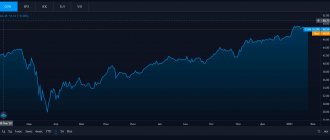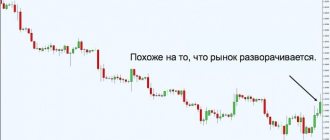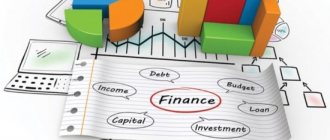Create a trader strategy
The most universal and easiest way for any beginner to start learning the basics of investing is from books. With a book, you are not tied to a specific time; you can always put it aside for a while or read it at your own pace. But this is both a plus and a minus. But if you are able to sit yourself down (or put yourself to bed?) for regular reading, then even at a snail’s pace you will overcome this difficult topic. The key here is to choose the right books for novice investors. Well, we have compiled a selection for you - beginners have a lot to choose from. But you won’t be able to read while lying down - these are not detective stories or thrillers. You will want to take notes on something or write down a question that has arisen along the way.
Let's move on to the list of books.
You will not find books by Kiyosaki, Schaefer or Covey in it - these authors are good as motivators, but they do not disclose the details of the kitchen of investing in securities. And if you are interested in cuisine, then you need other books and other authors. They will give you food for thought and analysis.
6. “Bond market. Analysis and Strategies", Frank Fabozzi
A textbook for any financier. Here, readers will learn about the fundamental characteristics of bonds, types of issuers, bond maturities and their significance, as well as fixed and floating rate securities, bonds with embedded options, and the impact of embedded options on cash flow. In addition, the book covers convertible bonds, the risks of a fixed income investor, and many other bond market issues. Buy a book!
Bodo Schaefer “The Path to Financial Freedom”
- Electronic version on liters.ru
- Paper version on labirint.ru
Another favorite author from foreign investors. His children's book about the dog Mani definitely changed one life - mine. But reviews from readers from all over the world show that it’s not just mine. I then recommended it for reading to everyone who wanted to get that final kick that would push him into the world of investing and managing his personal money.
And this is a completely different work - more serious and, in my opinion, even philosophical. Bodo Schaefer's path to financial freedom is changing your attitude towards money. And the book is a powerful motivator not to put off the first step to wealth until a more appropriate time.
Bodo Schaefer claims and proves from his own experience that you can learn to create wealth in the same way as swimming, diving, programming, etc. He describes 4 strategies in the book:
- Every month you save a certain percentage of your income. And it doesn’t matter what size it is today.
- Every ruble (dollar, euro) you save you invest in something that will generate income.
- You are constantly working to ensure that your income grows year after year.
- And again, you save a certain percentage of your already increased income.
If you use all of these strategies, the path to financial freedom will not last a lifetime.
7. “The Peter Lynch Method. The Strategy and Tactics of the Individual Investor, Peter Lynch
The premise of the book is that simple valuation techniques can allow even a novice investor to become an expert and make decisions as well as Wall Street professionals. The author first invites readers to evaluate themselves as potential investors. After that, he examines the issues of finding promising investment opportunities so that the reader learns what to strive for, what to avoid, and how to interpret financial indicators. Finally, the author examines specific aspects of investing (namely, when to buy and when to sell). Buy a book!
Alice Schroeder "Warren Buffett. The best investor in the world"
- Paper version on labirint.ru
Much has been written and said about this richest investor. This book is a biography of Warren Buffett, his life, advice and invaluable experience. Be patient. The book is almost 900 pages.
Will you get anything valuable from it? Depends on your motivation. Perhaps for some it will become a real instruction for action and certainly an incentive to read even more books on investing.
The publishers of this multi-page work claim that the book can inspire new achievements.
02.03.2020
11 207
The best books on financial literacy - learning to manage your money
A selection of books on finance, financial thinking and money management.
“Young investor. How to be financially literate from childhood by Catherine Bateman
The author explains the basics of finance and personal savings in an interesting way and in clear language. After reading the book, readers will learn what stocks and bonds are for, how to buy and sell securities and investment fund shares. Simple examples show how to read stock quotes, balance expenses with income, and explain basic financial terms in clear terms.
Now you have a book “investment portfolio” in your pocket. Use these books to invest wisely!
William Bernstein, The Investor Manifesto, Smart Asset Allocation
The author of these two books on investing for beginners is a Ph.D., neuroscientist, co-founder of the investment firm Efficient Frontier Advisors LLC, and editor of the magazine of the same name, which writes about assets and investments. Feel free to start with his books - they are written in a humorous style and therefore easy to read.
You may ask, why does a doctor write about such things? Bernstein, as a neurologist, understands very well people who are never financiers and want to learn investing from scratch, but their profession and lifestyle are too far from this topic. As a matter of fact, he had the same situation. Therefore, he knows that it is much more difficult for these people to master the field of investment than for anyone else. And he writes as clearly as possible about long-term investment tools that can be applied in today’s chaos in the markets.
A selection of books that deserve attention
“The Richest Man in Babylon” George Samuel Clason
The pages of the publication offer ancient, but still relevant today, principles of money management, accumulation and increase of capital.
The author gives advice based on personal experience, putting it in the form of very interesting “Babylonian parables”. Clayson's book is simple and accessible even to those who are still very far from the world of finance.
“Poor Charlie's Almanac” Peter Kaufman
The author tells real facts from the biography of Charles Munger, his philosophy of doing business and business, and provides key principles that help to become a successful investor.
The book provides many examples of the main ideas of speeches at meetings of Berkshire Hathaway, of which Munger is a vice president.
One of the main topics of the publication is “The Psychology of Human Behavior,” which reports on the cognitive traps that attract investors in pursuit of large incomes.
“Common Stocks and Extraordinary Returns” by Philip Fisher
We are talking about a publication by a famous American economist and investor who managed to achieve enormous success in this area.
The book is considered a visual aid for every long-term investor planning to invest in shares of the most promising firms and enterprises.
It examines the peculiarities of choosing the moment of sale and purchase of securities. When choosing stocks, it is necessary not only to focus on reporting, but also to carefully evaluate the company's management and corporate culture.
The author of the book sets out his own thoughts on analysis in securities analysis, relegating to the background the company's financial statements, conversations with employees of the business he is interested in, its suppliers and competitors.
Philip Fischer is confident that it is worth investing in something that is familiar in terms of action and development.
“Your money should work” Vladimir Savenok
This publication is one of the best options for beginners in the investment market. The author tries to describe various ways and methods of investing as clearly and simply as possible.
Information is presented based on the risk tolerance of three individual people. V. Savenok’s book is easy to understand for beginners but serious investors.
“Stress Test: Reflections on the Financial Crisis” by Timothy Franz Geithner
We are talking about a book from a famous economist who served as the American Secretary of the Treasury.
Experience in managing one of the world's largest economies during serious financial turmoil enables the author to formulate the most significant recommendations for the field of management in times of crisis.
The author talks about how to launch a successful business and how to manage it in conditions of financial stress. According to the author, a period of recession is an opportunity to quickly overtake competitors.
"The Intelligent Investor" Benjamin Graham
From this book, everyone will learn the real difference between speculation and investing. Also here you will find answers to questions about how an active and passive investor works, what value investing is.
Graham is rightfully considered the father of the concept of investing. The book “The Intelligent Investor” itself is truly considered one of his best creations.
“Investors versus speculators. Who Really Runs the Stock Market" John Bogle
The author of the publication, the founder of the Vanguard Group, expresses his personal opinion that speculators are trying in every possible way to force out long-term investors.
After all, all short-term players with costs for exchange transactions, as a rule, take away income from investors, often leading to negative consequences in the economy.
The author in the book “Investors vs. Speculators” tries to warn investors, recommending a return to the general principles of investing for the long term.
“A random walk down Wall Street. A Time-Tested Strategy for Successful Investments” Burton Malkiel
It is with this book that many recommend starting to study the investment world. Here all complex things are presented in accessible and simple language.
The book describes many interesting historical facts, including stories about “financial bubbles” and various scams.
The book also contains answers to questions about how to correctly form an investment portfolio, assess the levels of risk and possible profitability, real estate, shares and other assets.
“Security Analysis” Benjamin Graham
The book is still considered #1 for accurate and clear analysis of securities. Here we describe the techniques by which Buffett managed to amass a huge fortune.
The book will help you correctly evaluate the company's assets, make value investments and accurately describe possible risks and prospects.
“8 financial misconceptions. Money Management” Robert T. Kiyosaki
The main task of the publication is to rebuild everyone’s brains in the right “money direction.” The book provides useful recommendations to help you get rid of negative financial thoughts.
New information will help everyone expose false advice and take the reins of managing their savings into their own hands.
“The path to financial freedom. First million in 7 years” Bodo Schäfer
The author of this book managed to talk about complex things in very simple words, putting everything clearly on the shelves.
The publication provides many practical and specific recommendations on how to save, how to correctly formulate financial goals, how to avoid accumulating debt, etc.
Among other things, from the book The Path to Financial Freedom by Bodo Schäfer you will learn about money management principles that are quite motivating.
“Options. Volatility and valuation. Options Trading Strategies and Methods” Sheldon Natenderg
The publication on finance is based on educational materials used by traders of the famous SWOT exchange in Chicago.
The strategies and approaches presented by the author are quite successful in the options market, understandable and simple in real-world use.
For the most part, the book contains an analysis of practical situations, trading tactics, how they work, where they should be applied, taking into account the trading style and goals of the trader.
“The psychology of investments. How to Stop Doing Stupid Things with Your Money by Carl Richards
The author of the publication, so to speak, “ate the dog” on financial planning. The book provides many very interesting examples of how ordinary people constantly fall into the same traps of absolutely unjustified and useless expenses.
In each of the situations described in the book, readers will find themselves or one of their friends and acquaintances. The author provides the simplest, but at the same time, radically changing “consumer behavior” tips and recommendations.
“A man for all markets. From Las Vegas to Wall Street” Edward O. Thorpe
The author is known primarily for his invention of a card counting technique, which makes it possible to easily and quickly beat even the most experienced players.
The author’s impeccable formula is so strong that in different casinos around the globe, after its appearance, the gambling rules were adjusted.
As a result, this had a special impact on the overall evolution of the work in this field.
The book is definitely recommended reading.
“How to find money for your business. Step-by-step instructions for attracting investments” Oleg Ivanov
Readers are presented with practical recommendations from a person who has gone through all stages of attracting private capital. We are talking, first of all, about small businesses, which have virtually nothing in common with modern high technologies.
The author presents seven main stages of attracting investment in ordinary business projects.
Assessment of the project, the real risks of the investor, legislative issues, life after the transaction, the main barriers to the investor’s financial growth - the author talks about all this in detail in his publication.
“Wise Asset Allocation” by William Bernstein
The author of the book is a portfolio manager. In its publication, everyone will find advice on how to correctly distribute savings between stock indices, as well as bonds, markets of different countries in order to obtain the highest return with moderate risk.
The emphasis is on the “buy-hold” strategy to obtain the best return on invested funds.
The book is useful for those who do not intend to bother with financial statements, but would like to learn how to competently draw up an investment portfolio.
“The Exchange for Blondes” Alexander Gerchik
The author of the book “Exchange for Blondes” tries to explain in an understandable form the essence of trading on the exchange, analyzes risk options, strategic approaches and tools for effective exchange work.
The book will help you understand when it makes sense to move to foreign sites. The author considers each issue from the point of view of both the seller and the buyer.
“Investor Manifesto. Getting ready for shocks, prosperity and everything else.” William Bernsheim
Excellent investment guidance from a true best-selling author, Ph.D., neurologist, and one of America's smartest and most successful financiers.
Bernstein provides readers with information on how to properly manage investments in both bad and good times, and get a decent return on investments in different assets.
The author encourages everyone to take time to focus on their finances, even if they have their own professional advisor.
“Great Investors” Glen Arnold
There are quite a few popular personalities in the world with a real talent for making money. But how did such success icons as Warren Buffett, Benjamin Graham, George Soros become so successful?
The author of the book succinctly and subtly describes the investment philosophy of great investors known throughout the world. It also describes tactics, techniques and techniques in accumulating money by people who have achieved real success.
“The Peter Lynch Method” Peter Lynch
The author of the publication is considered one of the top mutual fund managers. He is ready to show how any individual investor can find a tenfold (as Lynch himself says), that is, a stock that will grow tenfold in the future.
After advice on selecting stocks, the author of the book gives recommendations on when it is best to enter and when to exit the market. This book will certainly be interesting and useful to traders and investors around the world.
“The Little Book of a Stock Market Winner” by Joel Greenblatt
There are two reasons to read this book:
- Its author is a successful investor and Ivy League teacher.
- The book purports to be a very useful guide to investing. The strategy proposed by Greenblatt gives his enterprise about 40 percent per annum, and, according to the author himself, it is always effective for everyone.
“The secret language of money. How to Make Smart Financial Decisions by David Krueger
The book will be useful to all those who want to learn more about money and the laws of earning it, about opinions and expectations, as well as modern prejudices related to making money and running their own business.
The author gives each reader the opportunity to personally track his “financial history” and suggests what needs to be changed in it.
The book includes effective techniques for overall improvement of financial behavior, which are based on serious scientific research.
"Black Swan. Under the sign of unpredictability” Nassim Nicholas Taleb
We are talking about a very high-quality book for economists, which has become a real world bestseller (over 3,000,000 copies).
The author believes that the main reason for financial failure is excessive self-confidence. People often focus on events that are far from the most important, while losing sight of the onset of more significant and global events, those very “black swans”.
The result is a new revelation and a real shock, global changes in ideas about the world around us.
“Global financial crises. Manias, panics and crashes” Charles Kindleberger
We are talking about a book that has successfully survived six editions. At the same time, the last of them offers readers the most in-depth analysis of the world's first global economic crisis of the current millennium.
Exploring topics such as crisis history, the Lehman brothers' case, and speculative manias, Kindleberger's brainchild presents them in a highly intelligent and engaging manner. This is certainly a classic of modern financial literature.
“The Small Encyclopedia of a Trader” Eric Neumann
This book is often called the Forex Bible. And all thanks to the fact that it clearly describes the basic principles of fundamental and technical analysis, and also provides hundreds of existing trading strategies with their detailed descriptions.
Great attention is paid to risk management and the basic principles of limiting possible losses.
“Good to Great” Jim Collins
This publication is a continuation of the book “Built to Last”. Collins's book clearly identifies the companies with the best performance indicators and reveals the characteristics of their heads and directors.
So, for example, 5 Level top managers are characterized by an unshakable desire to achieve their goals and a certain modesty of character.
In addition, a culture of honor is widespread among them.
“Think Slowly... Decide Fast” Daniel Kahneman
The author invites readers to a radical revision of the work of the mind, explains the principles of operation of two systems, the first of which is intuitive and quite fast, formed by emotions, but the second is slower and reflective, based on logic.
Any market movement, every move taken, according to the author, can be considered from the point of view of such fundamental systems that are responsible for every decision.
“Behavioral economics. Why people behave irrationally and how to make money from it” Dan Ariely
The author of the publication spent many years researching the main features of individual behavior under the direct influence of various life factors.
In the book, Ariely describes various experiments that led him to the formation of a theory that explains the motivation of human actions. Why do we buy specific things? What impulses and attitudes guide us?
“Business and Innovation” Peter Drucker
The author of the book is rightfully considered a leading theorist in the field of management. It is the depth of perception and understanding of innovation in Drucker's book that is a valuable contribution.
Peter Drucker clearly and simply explains the key elements of modern innovation, giving real examples of their use.
Despite the simple fact that Business and Innovation was first published in the mid-80s. last century, her ideas still work today.
“The Science of Money” Brian Tracy
The author of the publication talks about the whole financial science with its different rules and laws.
Tracy also tries to teach the reader to navigate the world of money well, completely discarding unnecessary things, highlighting key “financial truths.”
“The Rise of Money: A Financial History of the World” by Neil Ferguson
We are talking about the favorite publication of the CEO of the Coca-Cola Company, Mukhtar Kent. The book clearly traces the evolution of the entire financial system.
Entrepreneurs are increasingly turning to this creation of Ferguson in order to clearly understand the concept of macroeconomic components, which, one way or another, play a decisive role in the success or failure of their activities.
“My Millionaire Neighbor” Thomas Stanley
One of the best creations for readers of middle social strata.
Who doesn't dream of figuring out how to become a millionaire? In fact, everything is extremely simple and transparent: you shouldn’t waste money on stupid things that surround us literally everywhere.
Readers will easily find this and other similar recommendations in this guide from very successful and frugal millionaires. And how to apply them in their activities is up to everyone to decide for themselves.
“Geniuses and Outsiders” Malcolm Gladwell
One of Gladwell's best-selling books, it's about hard work and human luck that together are guaranteed to lead to success. Without hard work, luck is nothing.
The author claims: the creation of anything ingenious requires at least 10,000 hours of work.
"Technical analysis. The Complete Course" Jack Schwager
We are talking about a book that is valuable for every participant in the Forex market, and for a trader who works with futures, shares, and CFDs.
The publication provides a detailed description of the features of technical analysis not only using examples of classic candles, but also bars, as well as Kagi and Renko charts.
The book is quite complex for poorly prepared investors, but is intended for traders with real practical experience.
“How It All Began” Jessica Livingston
Livingston's book talks in detail about all the most important initial stages in the life of various types of startups. How everything happened during the tech boom in the 80s. last century, how everything came to Web 2.0.
Among other things, the publication contains the thoughts of many experienced and successful entrepreneurs, which can be a very good recommendation for action.
“Capital in the 21st Century” Tom Piketty
It was Piketty who successfully reincarnated the text of “Capital” by Karl Marx himself, taking into account the post-industrial era of globalization.
The economic publication does not contain philosophical or ethical considerations - it is based only on specific indicators and official statistical data.
The reaction to the book's appearance was mixed: Larry Summers (former American Treasury Secretary) criticized it, and Bill Gates personally discussed the book with its author.
"Stock market. Course for beginners” Team of authors. From the series “Reuters for financiers”
This is a book that is often called “Trading for Dummies” - a well-illustrated ABC book that will come in handy for every trader.
The publication gives an idea of the modern stock market, simple concepts (what a bond and a share are, how the circulation of securities is regulated, etc.).
The book is useful for both beginners and experienced traders and investors.
“The Economic Way of Thinking” Paul Heine, Peter Bouttke, David Prychitko
The book is a must-read for anyone looking for a competent and accessible introductory course to economic theory.
The authors explain the basic principles and terms using the simplest examples (the essence of the concepts of “demand” and “supply”, “monopoly”, “competition”, the history of the origin of money, causes of unemployment, etc.)
“Principles of Economics” Nicholas Gregory Mankiw
A true classic, a must read. This book teaches you to think like economists.
The author manages to cover a variety of topics: from fundamental economic theory to the theory of international trade and the public sector, as well as industrial organization.
Basic information for those interested in economics is briefly and concisely collected here.
“How Successful People Think” John Maxwell
Successful people are not always smarter than others, they just know well how to think differently.
Leadership guru John Maxwell outlines key approaches to a disciplined and innovative thinking process, showing examples of how best to use the 80/20 principle (Pareto's Law) for energy distribution.
“Why are some countries rich and others poor” Daron Acemoglu, James Robinson
The book provides an analysis of factors influencing the economic development of countries (geolocation, natural resources, cultural characteristics and mentality).
Depending on this, there are many possible answers to the main question of the book.
We are talking about a printed publication for the mass reader, but this is actually a deep analytical work with real data and facts.
“Undercover Economist” Tim Harford
The manual talks about basic economic ideas using examples of phenomena and observations that are known to everyone.
Thus, using the cost of a cup as a basis, the author talks about the impact of price on limited resources. On the other hand, the author explains, using the example of a trip to the supermarket, the principles of price discrimination.
“Ten Essential Rules for the Beginner Investor” Burton Malkiel
The Princeton University professor describes the simplest, yet effective ideas for doing business and investing, which make it possible to embrace the essence of the financial world, feeling like a fish in water.
Malkiel provides a variety of tools to help even seasoned professionals significantly reduce risk.
“How the Economy Works” by Ha Joon Chang
The book by a professor of economics at Cambridge University is a clear and concise presentation of data on the stages of development of capitalism from the 2nd century to the present.
The author clearly explains key concepts and terms that are important to economists (gross domestic and national product, economic growth, unemployment, inequality and poverty).
Information about different schools of economic theories and an analysis of the influence of the state on the market are presented.
“Start with Why” Simon Sinek
The economic book is formed on the simplest idea - clarifying the long-term and long-term vision of the company.
To run a successful business, it is very important from the very beginning to understand why a clear organization of the company’s work is needed, what is its importance for the end consumer?
Answering questions like these greatly simplifies key organizational decisions.
“Liar's Poker” Michael Lewis
The book for novice traders is written in the form of a journalistic investigation without practical recommendations, which makes it easier to read and understand.
The author managed to convey the atmosphere in a company whose employees are engaged in stock trading.
It is based on the story of a Salomon Brothers bank employee who rose from trainee to the highest level by trading junk bonds.
“Alchemy of Finance” George Soros
George Soros is still considered the most influential and successful investor in the world. In the next edition of his classic work, the author talks about modern financial trends and a new market paradigm.
The information is presented in an easy and simple language for everyone.
“The Trader Is a Crook” Nick Leeson
The book is interesting for two reasons. After all, we are talking about a real scandal associated with a truly royal bank.
In addition, the book is an excellent example of how an uncontrolled person can destroy an entire organization. It talks about an example that makes you think about the effectiveness of the system of laws.
“Essays on Investing, Corporate Finance and Company Management” Warren Buffett, Lawrence Cunningham
Buffett is one of the richest people in the whole world. It is his approach to investment that is the standard for millions of people.
The author outlines his letters to Berkshire Hathaway shareholders, which provide important educational material and reflect his personal investment philosophy.
The book contains aphoristic and precise statements about the nature of investments and business, touching on the most important topics for investors and managers.
“A Random Walk Down Wall Street” Burton Malkiel
Burton Malkiel believed it made sense to invest in affordable index funds. Although at the time the book was written, these simply did not exist.
Now the publication is a textbook for beginners and experienced investors. Malkiel is a proponent of passive investing, and he outlines the arguments for portfolio rebalancing and diversification, tax accounting, and dividend reinvestment.
“Memoirs of a Stock Speculator” by Edwin Lefebvre
This is a work of fiction that has become a leader in financial literature thanks to its detailed description of the real practices of Wall Street.
Lefebvre presents the typical style of reasoning of a stock trader, his mistakes in his career, and the results of his work.
The author is far from working on the stock exchange, but as a good journalist and writer he was able to reveal the psychology of investing and the basic mechanisms of market demand and crowd behavior.
“Rich Dad Poor Dad” Robert Kiyosaki
Kiyosaki is a cult entrepreneur and author of popular business seminars. He wrote his book together with Sharon Lecter.
Kiyosaki focuses on real estate and asset investments, all-round independence, financial IQ to help improve basic business skills.
The book that inspired millions of people to start thinking about investing.
“Outplay Wall Street” Peter Lynch
Lynch was the head of the Magellan investment fund, which thanks to his work became the largest in the world.
The author reveals his secrets to readers, shares the rules and experience that helped him make the right decisions in the field of investing and trading.
Lynch emphasizes the importance of knowledge about the industries in which you plan to invest, ideas about the reasons for investing, and intelligence and patience in working with mutual funds and stocks.
“The Beginning Investor’s Book” Anton Monin
The author describes in detail the features of using modern financial instruments that are relevant for residents of the Russian Federation.
Anton Monin does this using the example of three dozen different strategies for accumulating financial resources.
“Warren Buffett. How to turn 5 dollars into 50 billion. The Strategy and Tactics of a Great Investor” Robert Hagstrom
The book is dedicated to the investment work of tycoon Warren Buffett, who has been the leader among the richest people in the world for several years in a row.
With 50 years of experience in the investment field, he has achieved success through smart tactics and hard work.
Robert Hagstra can also be called a well-known investment strategist. In his book, he introduces readers to the key investment principles that helped Buffett.
“Think and Grow Rich” Napoleon Hill
The book was published in the first half of the last century and talks about the basic principles and secrets of making money. The publication has not lost its relevance to this day.
The author conducts personal discussions about the importance of writing a clear financial plan, about the correct distribution of basic resources - money and time.
“Personal Finance-2” Alexey Pokudov
Pokudov’s book talks about the exceptional importance of savings and forms a clear plan for increasing capital depending on the plans of the investor himself.
The author provides a detailed description of key domestic financial instruments that help achieve set goals - endowment insurance, investments in MFOs and CPCs, mutual funds, etc.
“Money. Unofficial biography of money” Felix Martin
Could money have appeared for purposes other than for exchanging one good for another? The author of the book is sure that this is quite real!
Having studied in detail the financial history from Ancient Mesopotamia to the present day, Martin understood: financial resources are needed to regulate disputes and establish public relations in society.
Money is designed to ensure economic development and maintain social stability. Abuse of the power of money by financial institutions leads to instability in the economy at the national and global level.
“Rework. A book that will change the way you look at business” Jason Fried, David Heinmeier Hansson
A book about motivation and entrepreneurship - the author's view of business activities from the founders, which is known for its entire list of popular and in-demand products.
“A whole life. Key skills to achieve your goals” Les Hewitt, Mark Victor Hansen, Jack Canfield,
The main idea of the book is that only a clearly formulated goal doubles the chances of its successful implementation.
The publication teaches you to set ambitious, but at the same time close and achievable goals, focusing on the main thing, without wasting energy on the unimportant.
“Marketing Hacker” R. Holiday
The book sets out the main idea - new economic conditions require a new type of thinking. It doesn’t matter what we’re talking about: a startup or a large company, it’s important to abandon old scenarios and find shorter routes to the client.
It is this kind of work that has helped brands such as Facebook, Dropbox, and Twitter become successful.
“It Won't Be Easy” Ben Horowitz
The book reveals the secrets of the authors, which are associated with a new unusual view of entrepreneurial activity.
The authors are confident that to achieve success it is necessary to abandon ready-made solutions and standard algorithms, look for something new and always act creatively.
“Getting Things Done” by David Allen
The publication will teach everyone to be the true and only master of life. The basis of the methodology is the achievements of the author’s 12 years of work, which he shares with the audience.
“Turn yourself into a brand” Tom Peters
The book was written by a man who earns $50,000 every day. He knows exactly how to achieve success and create a truly successful business.
“12 Weeks a Year” Brian Moran, Michael Lennington
In fact, it is difficult to imagine what will happen over the course of a whole year. But such a period as 12 weeks is quite noticeable.
The authors of the publication offer an interesting method for achieving success and increasing your productivity several times by changing the approach to drawing up a work plan.
For the most experienced
“Out of the ordinary! How to make money on alternative investments”, Gerald Autier
“Personalize your investments,” advises Gérald Authier. Why does everyone need to invest in the same thing? Perhaps you are the one who should invest in gold or a house abroad. Or maybe it will be much more pleasant for you to have an expensive painting or a rare car in your collection, which also grow in value.
Today, investors are rethinking their approach to traditional assets. The book by Authier, a financial consultant who has been practicing for 15 years and whose clients include top managers and bankers, examines alternative investment options. These could be renewable energy or commercial real estate, precious metals or luxury goods, hedge funds or private companies. By sorting out all the features of each type of asset, Authier shows possible investment strategies and explains to whom they are most suitable.
Buy a book
“Market cycles. How to Identify and Use Patterns for Successful Investing by Howard Marks
If you are already familiar with the world of finance, you have probably noticed that some events in the market repeat themselves and sometimes you are even able to predict them. In order to save yourself time on making standard decisions, it is better to study cyclical patterns as carefully as possible.
The market operates according to standard scenarios, but often its fluctuations are influenced not only by obvious external events, but also by people’s emotions. Howard Marks himself, co-chairman and co-founder of the investment firm Oaktree Capital Management, which manages assets worth more than $120 billion, will teach you to feel the market more subtly. One of the greatest investors of his time, the author of the book teaches in a lively and easy way how to recognize and evaluate market cycles, avoid going to extremes, and use knowledge to act astutely in the stock market.
Buy a book
Burton Malkiel A Random Walk Down Wall Street. Time-tested strategy for successful change"
If you have previously tried to read smart books about investments, where there are a lot of complex charts, and they didn’t “get” you, then you will definitely like Malkiel. He teaches economics at Princeton University and also serves as managing director of investments at Wealthfront.
Describing the strategy of successful changes, the author gives examples of many different manias that caused the formation of soap bubbles in the markets - starting with the tulip fever in the Netherlands in the 19th century, ending with the dot-com boom in the States in the 80s of the 20th century. In the book, he provides the basics of investing in an accessible form, examines the pros and cons of technical and fundamental analysis, and analyzes various aspects of the latest investment technologies.
Mark Harrison "The Artful Investor" Manage your investments professionally."
Today, simply saving money is no longer relevant - prices are rising by leaps and bounds, and money is depreciating. What you have accumulated must somehow be made to work. Investing is one of the ways. And Harrison's book about investments helps to understand who is who in the financial markets, how this whole system works. It gives a basic understanding of fundamental and technical analysis, which can then be supplemented with other books or courses that are more in-depth on this topic.
Particularly interesting are the chapters on the history of the stock market, on the common features of all known market declines and on the characteristics of each of them.
William F. Sharp, Gordon J. Alexander, Jeffrey W. Bailey “Investing. Textbook".
This is an ideal book about investing for beginners - there is a detailed description of goals, tools, types of stock markets, different types of assets, practical descriptions of how and what works, analysis of the effectiveness of investor actions, market analysis, asset valuation methods. Even if you are still new to finance and its laws, all explanations will be clear and comprehensive - at the end of each chapter there are clear examples of how to practically use the received theoretical calculations in trading.











